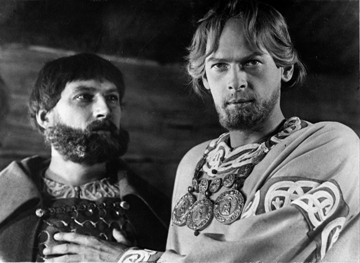So I guess Hitler didnt see this movie. From 1938, Sergei Eisensteins patriotic anthem Alexander Nevsky is basically a warning to foreign invaders with a moral so clear that the movie repeats it twice: He who comes to us with a sword shall die by that sword. None of which deterred Germany from invading Russia in 1941, with disastrous results. You cant say the Soviets didnt tell them, since the enemies in this 13th-century tale are, yes, Germans. In defense of feudal, pre-imperial Russia is Prince Alexander (the heroically tall, handsome Nikolai Cherkasov), who, despite the dithering bourgeois, enlists the hardy proletariat to be his army. Alexander Nevsky is a movie of speeches and tableaux, and it succeeds more at the latter. A genius of silent moviemaking (see: Battleship Potemkin), Eisenstein was a master of faces, not words. (Though, in his defense, every word of the script had to be vetted by Communist authorities; and no less a critic than Josef Stalin supposedly changed the ending.) The movie is most rousing in its outdoor scenes and peasant chorales (with score by Sergei Prokofiev), and in the massive battle sequences (thank you, Red Army extras) that are all grunting and shoving, waving spears, and bizarre helmets, with the ice of a frozen lake cracking beneath the soldiers feet. But the films greatest moment comes after battle, as new widows roam the silent, darkened battlefield, calling out the names of their slain husbands. So it would be, on a much vaster scale, just a few short years after the picture debuted. BRIAN MILLER
Dec. 12-18, 7:30 p.m., 2008




